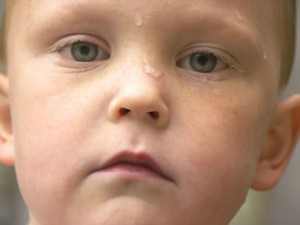Published: August 16, 2011
Researchers think that brains are sensitive to the quality of child care, according to a study that was directed by Dr. Sonia Lupien and her colleagues from the University of Montreal published August 15,2011 in the Proceedings of the National Academy of Sciences. The scientists worked with ten year old children whose mothers exhibited symptoms of depression throughout their lives, and discovered that the children’s amygdala, a part of the brain linked to emotional responses, was enlarged.
Similar changes, but of greater magnitude, have been found in the brains of adoptees initially raised in orphanages. Personalized attention to children’s needs may be the key factor. “Other studies have shown that mothers feeling depressed were less sensitive to their children’s needs and were more withdrawn and disengaged,” explained Drs. Sophie Parent and Jean Séguin of the University of Montreal’s, who followed the children over the years. [continue reading…]
Published: August 16, 2011

Image:Istockphoto
A new post-traumatic stress disorder (PTSD) prediction tool, developed by Geisinger Health System researchers, is simple to administer and appears to outperform other screening methods, according to new findings published electronically in the August issue of the journal General Hospital Psychiatry.
After collecting information from more than 2,300 adults following the Sept. 11, 2001, terrorist attack on the World Trade Center, Joseph Boscarino, Ph.D., MPH, senior investigator II, Geisinger Health System, and his co-investigators, including Charles Figley, Ph.D., Tulane University, examined the clinical factors that could predict PTSD. These included stressor exposures, psychosocial resources, functional status, depression symptoms, suicidal thoughts, PTSD symptoms and demographics. This was done to identify the best PTSD prediction models. [continue reading…]
Published: August 16, 2011

Image: Creative Commons Studio Vision 1
Moderate social drinking significantly reduces the risk of dementia and cognitive impairment, according to an analysis of 143 studies by Loyola University Chicago Stritch School of Medicine researchers.
Researchers reviewed studies dating to 1977 that included more than 365,000 participants. Moderate drinkers were 23 percent less likely to develop cognitive impairment or Alzheimer’s disease and other forms of dementia.
Wine was more beneficial than beer or spirits. But this finding was based on a relatively small number of studies, because most papers did not distinguish among different types of alcohol.
Results are reported in the journal Neuropsychiatric Disease and Treatment. The authors are Edward J. Neafsey, PhD. and Michael A. Collins, PhD., professors in the Department of Molecular Pharmacology and Therapeutics.
Heavy drinking (more than 3 to 5 drinks per day) was associated with a higher risk of cognitive impairment and dementia, but this finding was not statistically significant.
“We don’t recommend that nondrinkers start drinking,” Neafsey said. “But moderate drinking — if it is truly moderate — can be beneficial.” Moderate drinking is defined as a maximum of two drinks per day for men and 1 drink per day for women. [continue reading…]
Published: August 15, 2011

Image: Fotolia
or some children, the excitement of starting or going back to school turns to fear at the bus stop or classroom door.
Separation anxiety is a real condition for many children and their parents on the first day of school, says Samuel T. Gladding, professor of counseling at Wake Forest University and author of the book Family Therapy: History, Theory, and Practice (5th Edition) (Merrill Counseling)
Not being well-prepared for the separation makes anxiety worse, Gladding says. He offers parents tips for how to avoid emotional scenes with children clinging tearfully to them when it is time to say goodbye. [continue reading…]



